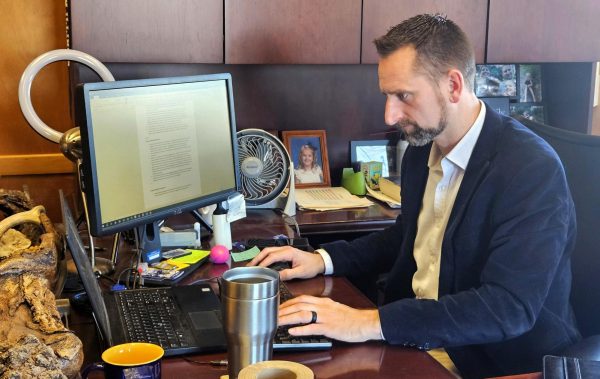On-campus enrollment at EIU has fallen by 9.77% this semester compared to last spring.
This is the most on-campus enrollment has dipped in the past 10 years beside spring of 2021—post COVID-19.
Largely, the drop came from international enrollment, according to Vice President for Enrollment Management Josh Norman.
“We planned for some decline in international enrollment, but we definitely didn’t anticipate the level of decline we saw this spring,” he said.
Compared to last spring, on-campus enrollment fell by 438 students to 4,044 total.
Overall enrollment dropped by 5.77% from 8,688 to 8,187. Overall enrollment includes off-campus students and high school dual credit students.
Visa denial is predominantly to blame for the international drop, said Andy Kabasele, the assistant dean of the office of international students and scholars.
Around 240 international students in the process of enrollment had their visas denied this semester, Kabasele said. In the fall, that number was 196.
Fall has significantly more international admissions than spring, so a 22% increase in visa denial came out of the blue, he said.
About 61% of admitted international students were denied visas. This is a 12% increase from last year, according to Kabasele.
An admitted student is one who has been accepted to a university and can choose to go there or not. An enrolled student is one who not only has been accepted but has taken the steps to attend a university.
“It’s not like the applications weren’t there; it’s not like the students didn’t get admitted,” Norman said. “They just were unable to get their visas.”
Kabasele said visa denial is unpredictable. The reason for each denial is individual.
“We have no control of that,” he said.
Another issue facing admitted international students, Kabasele said, is a lack of visa appointments being available.
After COVID-19, visa appointments got further backlogged. According to the International Refugee Assistance Project in a Freedom of Information Act request to the government, at the high end it can take over two years to get a visa appointment scheduled.
One of the longest backlogs is in the consular office in Accra, Ghana, where it takes on average 520 business days to get a visa appointment.
Ghana is the country where EIU gets the most international student applications from, according to Kabasele.
Outside of international students, there was a flat rate on incoming undergraduate students.
Norman said there was one more new freshman and two more new transfer students this spring compared to last.
The loss appears to be from dropouts. In fall, there were 1,040 freshmen. In spring, there were 648. Similar drops happened in 2023-2024 and 2022-2023. Bigger drops than that happened in 2021-2022 and 2020-2021.
Grouped in with fall 2024’s 7.35% decrease, the incoming rate staying the same wasn’t enough to stabilize enrollment.
Looking forward, Norman said he expects some improvements for fall 2025.
“I think we have the potential to see a little bit larger freshman class this year,” he said.
Norman said tuition deposits are up by 4-8% for this time of year. Additionally, orientation reservations for fall are up significantly from 2024.
For first-year students, reservations are up by 38%. Transfer student reservations are up by 21%, and honors reservations are up by 28%, according to Norman.
He attributed this increase mainly to two enrollment plans: EIU’s direct admission program that started last year and a new state-sponsored admission program.
Starting in January 2025, funded by the Illinois Board of Higher Education and an Illumina Grant from the state of Illinois, EIU joined the Common Application.
Common App is one of the most popular college application apps with 1.2 million users submitting applications in 2024 according to Higher Ed Dive.
So far, EIU has made 51,000 admission offers through Common App to students in Illinois with a 3.0 or higher grade point average.
“We’ve never done anything like this before at this scale,” Norman said. “This is brand new this year.”
Norman said he isn’t sure how effective it will be since it’s so new, but he has high hopes.
He said he hopes this partnership will make EIU more known across Illinois. He hopes high schoolers will see EIU on Common App and look into the school’s programs and resources.
“My hope is that it hopes create line of sight for students who may not see themselves as college going,” Norman said.
Last year, EIU partnered with high schools in the region to offer direct admissions to students with a minimum 3.0 GPA. Applications and admissions are up in those districts for fall, Norman said.
Looking internationally for fall, Kabasele said EIU is expanding how many countries it gets students from. Last year, EIU had international students from 56 countries. Currently, that number is up to 61.
Some of those new countries include Côte d’Ivoire in Africa and Colombia in South America.
As of the beginning of March, Kabasele said there have been around 4,000 applications from international students to EIU. He said this number should increase before the middle of May.
Ghana has the highest number, with around 1,800 applications. India and Bangladesh make up around 300, and Nigeria makes up around 700.
These countries have the highest application rates and conversely have the highest visa denial rates too, Kabasele said.
The rest of the applications are split between the remaining 57 countries.
Right now, the office of international students is pushing efforts with Germany, Kabasele said.
In February, there were five or six applications there, up from two or three last year. He hopes there will be increases there before fall.
To build these relationships, EIU collaborates with overseas partners to get ground in other countries. Also, EIU contacts high schools overseas, though this can be difficult, Kabasele said.
Another large part of international students finding EIU is through word of mouth.
“In the past, a lot of Ghanaians and Indians have been graduating from here, and they have been successful in the global market,” Kabasele said. “So those [students] spread the news to their friends.”
For the past six years, EIU has received more international graduate student applications than undergraduate.
Graduate students make up around 80% of the international student population on EIU’s campus, Kabasele said.
But for fall, it looks like there could be a reversal.
“Our admission number right now, we have admitted more undergrad than grad so far,” Kabasele said.
Among the 4,000 applications, 1,500 are grad and 2,500 are undergrad right now.
“If that turns out that we end up admitting more undergrad and those undergrads show up, then that may reverse the enrollment or come even,” said Kabasele.
This could be a double-edged sword, however. According to Kabasele, international undergraduates have their visas denied more often than graduate students.
Kabasele said it won’t be until late April and early May, when visa applications start. Then, EIU can begin predicting how many denials there will be.

But in light of the denials this year and last year, Norman said EIU is putting more focus on recruiting from non-traditional students in the U.S. for fall.
Non-traditional students are those who go to college later in life, taking a gap after high school.
Norman said one way the university reaches these students is through corporate partnerships. Currently, EIU has 14 corporate partners. Nine of these partnerships are related to healthcare in some way, according to EIU’s website.
EIU offers up to $1,000 in scholarships for those who are employees of these companies. In return, the companies offer information on EIU to their employees and can offer pay scaling that grows with a college degree, Norman said.
Some of the biggest partners of EIU are Rural King and the Illinois State Police.
The most recent partner of EIU is Horizon Health in Paris, Illinois—announced on March 19.
According to the press release, Horizon Health “will actively share information about EIU’s programs with its employees through multiple channels such as its human resources website, employee newsletters, internal email communications and educational fairs and expos.”
Besides corporate partnerships, Norman said a way to reach non-traditional students is by developing in-demand degrees and finding occupations that need a bachelor’s degree to progress.
“Those are the two biggest: ensuring we’ve got the programs that are in demand for those populations and then identifying those partners where we can disseminate the information about the availability of those programs,” Norman said.
The official full enrollment plan for 2025-2026 just began development in mid-March, Norman said.
It will go to the board of trustees in June to be approved.
Norman said having lived through COVID-19 and through a faculty strike, he’s been through seen some challenges for enrollment. He said one thing the university is beginning to anticipate is the upcoming effects of the birth decline.
Since 2007, the number of births in the U.S. have declined by over 17%, according to the Centers for Disease Control. Those kids will be graduating high school this year, and many will go to college.
“Yeah, we’ve got things like the birth dearth ahead of us. There are things that are going to make decision making complicated, but I just have full confidence in our leadership,” Norman said. “I’m excited about the future of the university.”
Alli Hausman can be reached at 581-2812 or at athausman@eiu.edu.

















![[Thumbnail Edition] Senior Foward Macy McGlone, getsw the ball and gets the point during the first half of the game aginst Western Illinois University,, Eastern Illinois University Lost to Western Illinois University Thursday March 6 20205, 78-75 EIU lost making it the end of their season](https://www.dailyeasternnews.com/wp-content/uploads/2025/03/WBB_OVC_03_O-1-e1743361637111-1200x614.jpg)



















































![[Thumbnail] Eastern's Old Main was quiet Thursday morning while educators who had left the office to strike picketed outside.](https://www.dailyeasternnews.com/wp-content/uploads/2025/04/Strike_01_LT_O-800x1200.jpg)




